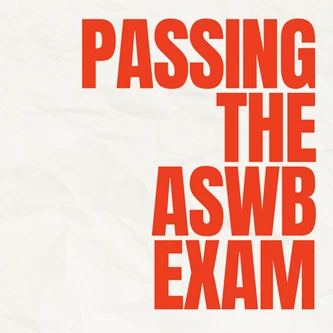 The ASWB exam is designed to assess the knowledge and skills necessary for competent, beginner social work practice. Is it hard? Well, yes and no.
The ASWB exam is designed to assess the knowledge and skills necessary for competent, beginner social work practice. Is it hard? Well, yes and no.
On one hand, you just need to correctly answer around 70% of the scored questions to pass. On the other hand, according to the latest figures from the ASWB, only 58-72% of test takers passed the exam (depending upon level). A good number of those people were retesting. So, it's not not hard.
The difficulty you experience on the exam can vary depending on preparation, familiarity with the content, test-taking skills, and which exam you get (there are multiple version of the exam at any given time and new versions of the exam regularly issued). For some, the exam may be challenging due to its comprehensive, and somewhat unpredictable coverage of a wide range of social work theories, practices, and ethical standards. However, thorough preparation through studying relevant materials, taking practice exams, and seeking support from peers and mentors can help alleviate many of the challenges.
Here are the five commonly cited aspects that social work licensing exam test-takers find challenging:
-
Comprehensive Content Coverage: As we said, the ASWB exam covers a broad range of topics related to social work theories, practice models, assessment methods, intervention strategies, ethics, and professional standards. The breadth of content can be overwhelming, requiring thorough preparation and a solid understanding of various concepts.
-
Complex Scenarios: The exam often presents complex case scenarios that require critical thinking and the application of theoretical knowledge to solve. Test-takers must read carefully, analyze information, identify relevant factors, and choose appropriate interventions or responses within a limited timeframe.
-
Ethical Dilemmas: Social work ethics are a significant component of the ASWB exam--ethical dilemmas are the heart of the test. Deciphering ethical principles, recognizing conflicts of interest, and making sound ethical decisions can be challenging, especially when multiple ethical considerations are at play. Studying the Code of Ethics is key.
-
Time Management: Managing time effectively during the exam is crucial, as test-takers must answer a large number of questions within a specified timeframe. Some individuals may struggle with pacing themselves throughout the exam, leading to rushed responses or leaving questions unanswered. Full-length practice tests--like those from SWTP--are the best way to gauge your speed and make any necessary adjustments.
-
Stress and Test Anxiety: The pressure of taking a high-stakes exam like the ASWB can contribute to test anxiety and stress, which may impair performance. Preparing for test anxiety and maintaining focus and confidence during the exam are a huge help for success.
Addressing these challenges requires preparation, including studying relevant materials, practicing with sample questions, developing critical thinking skills, and implementing effective test-taking strategies. Additionally, maintaining a healthy balance between studying and self-care can help alleviate stress and optimize performance on exam day.
You can pass the exam. It may take lots of effort and maybe multiple attempts. But you can get it done. Know that we're rooting for you. Good luck!

 The ASWB exam is designed to assess the knowledge and skills necessary for competent, beginner social work practice. Is it hard? Well, yes and no.
The ASWB exam is designed to assess the knowledge and skills necessary for competent, beginner social work practice. Is it hard? Well, yes and no.